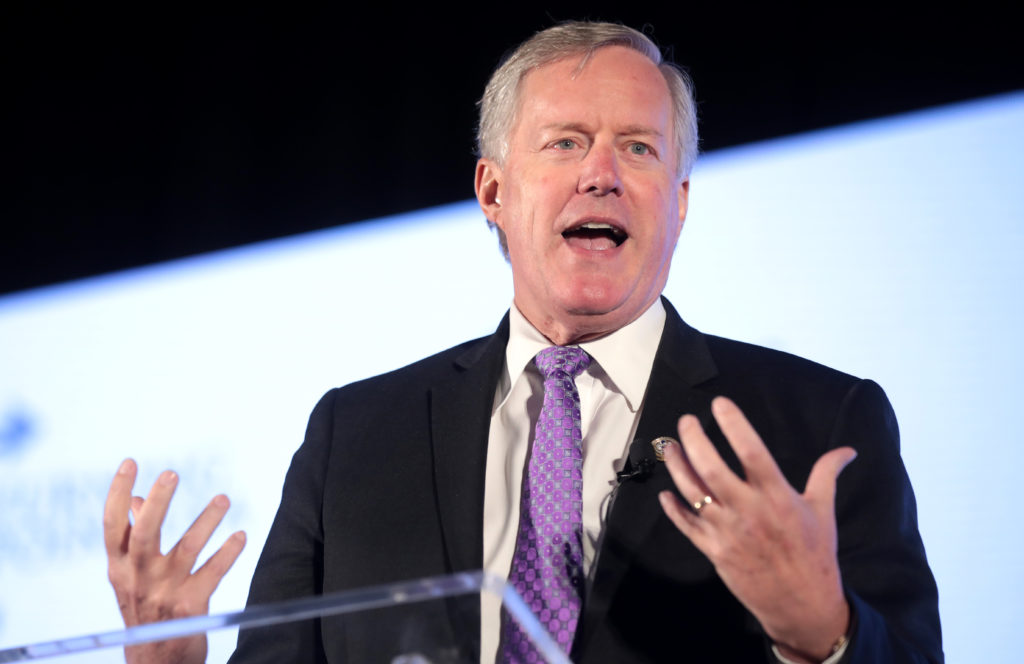The real reason the DOJ isn’t indicting Mark Meadows at this time

Hours after the DOJ indicted and arrested Trump adviser Peter Navarro for contempt of Congress yesterday, it announced that it’s not indicting Mark Meadows or Dan Scavino for contempt. This rather strange announcement didn’t fit with the aggressive nature of Navarro’s airport arrest for the same crime, and has resulted in a lot of head scratching.
Naturally, the doomsday pundits have assumed the worst, and have gone back to touting their usual ratings-friendly “DOJ is doing nothing” and “Trump world has gotten away with it all” slogan. But this doesn’t make much sense. If the DOJ is doing “nothing” about contempt of Congress as the doomsday types suggest, then why is it prosecuting Steve Bannon and Peter Navarro for contempt of Congress?
Theories have been floated about how Meadows and Scavino are protected by executive privilege, but that doesn’t really fly here. Besides, Navarro was a Trump White House adviser and therefore also had executive privilege in general – and recent court rulings have made clear that executive privilege doesn’t really apply to a congressional probe into a potential crime committed by a President.
Theories are also being floated that because Meadows and Scavino gave significant cooperation to Congress before breaking it off, the DOJ didn’t believe it would be able to get a conviction at trial. This is hypothetically possible. After all, there’s not much point in bringing an indictment if you expect the person will merely be acquitted anyway.
There is also the possibility that the DOJ has decided not to prosecute Meadows and Scavino for contempt because they’re secretly cooperating with the DOJ. The way Meadows has been running his mouth in public suggests otherwise. But we’ve seen plenty of Trump people publicly shoot their mouths off in order to keep Trump from turning against them, even while they were privately cooperating in investigations against Trump.
Given that the DOJ sat on the Meadows contempt referral for six months before declining it, this does give credence to the theory that Meadows has been cooperating all this time. If the DOJ felt the Meadows referral were invalid to begin with, wouldn’t it have announced its declination early on? There would seemingly be little reason for the DOJ to hang onto the criminal referral against Meadows all this time, before ditching it a full six months later, unless it was being used as a stick the entire time to motivate Meadows to keep cooperating.
But there’s another distinct possibility, and it’s one that Palmer Report has repeatedly flagged as the most likely reason why the Meadows referral was being sat on for so long. We all watched the DOJ indict Bannon for contempt of Congress, only for him to turn around and use the court hearings in that case to repeatedly try to force the DOJ to reveal the much broader criminal case that it’s been building against Bannon. Bannon presumably believes that if he can unearth the full case against him in advance, he can get a head start on mounting a defense against it. This tactic hasn’t succeeded for Bannon, but it’s been a real pain for the DOJ – and if it had drawn the wrong judge, the tactic might have succeeded.
If the DOJ were to indict Mark Meadows for contempt at this time, it would allow Meadows to use the court proceedings to do precisely what Bannon has been trying to do. Given that the DOJ’s overall election-related case against Meadows is likely one of the most complex and important of all time, the DOJ might be loathe to put it at risk by indicting Meadows on a smaller charge like contempt of Congress before the rest of the case is ready. After all, contempt comes with perhaps a year in prison. Meadows is likely looking at a de facto life sentence by the time the rest of the charges against him pile up.
In other words, this declination against Meadows leaves us with the same two plausible explanations we’ve had all along: either Meadows isn’t being prosecuted because he’s flipped, or Meadows isn’t being charged yet on the small stuff because he’s going to be charged on much bigger stuff. Nothing has changed in that regard. And what’s true for Meadows could well be true for Scavino. The “DOJ is doing nothing” slogan clearly doesn’t apply – and the DOJ’s somewhat dramatic arrest of Navarro at an airport yesterday seems to underscore the fact that the DOJ wants us to know the defeatist sloganeering doesn’t apply.
So why would the DOJ make a point of revealing right now that it’s not indicting Meadows or Scavino for contempt? Perhaps it simply felt the January 6th Committee was owed an answer on these criminal referrals before its public hearings begin. The committee is obviously displeased with this answer (unless it knows more than it’s letting on and this is all theater). But at least the committee has gotten an answer – for now. There’s no way this is over. Meadows is likely never getting out of prison unless he flips, or has flipped.
